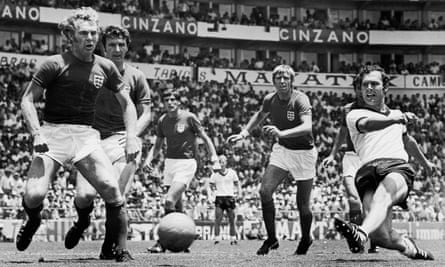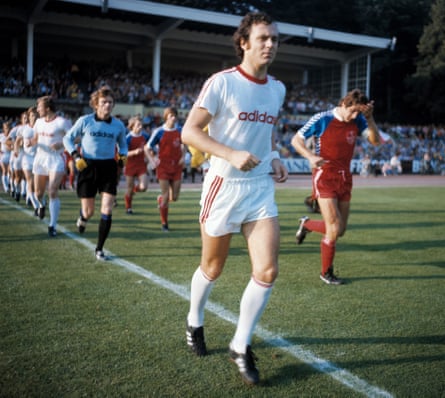
FRanz Beckenbauer will always have a place in football history, beyond popularizing the role of libero and establishing Bayern Munich as such The He is one of the biggest forces in German football and one of only three people to have won the World Cup as a player and coach. He had one of the best and most distinctive nicknames of all time, and just like his near-contemporary Eddy “The Cannibal” Merckx in cycling, his The emperor The nickname suited him and served to introduce him in advance.
Opinions differ as to where the name comes from. Some say he was asked to pose next to the bust of a real emperor, others point to an on-field incident in which he effortlessly defeated a German opponent known as the “King.” Either way, Beckenbauer always had something statesmanlike about him, be it as a player, manager or administrator. He seemed to be cut from a different cloth than most footballers, despite coming from humble working-class backgrounds in war-torn Munich.
Certainly Beckenbauer’s nickname did him more favor than the “water carrier” slur Eric Cantona famously leveled at Didier Deschamps before the Frenchman added a World Cup as coach to his playing triumph in 1998. Brazilian Mário Zagallo, the founding member of the famous trio of world champions, has sometimes been referred to as both “the professor” and “old wolf” (the latter being a play on part of his last name), but even that lacks authority and respect from The emperor.
Of the three, Zagallo’s World Cup record is probably the most notable, having won two tournaments as a player (1958 and 1962), one as a coach (at the unforgettable Brazil 1970) and one as an assistant coach in 1994. But Beckenbauer is not far away, he was runner-up as a player in 1966 and as a coach in 1986, won as captain in 1974 and as coach in 1990, and then successfully moved into sports politics to go to Germany as head of the 2006 World Cup bid, which was selected ahead of England’s .
Perhaps unsurprisingly, Beckenbauer was unable to escape his dealings with FIFA with his reputation completely intact. When criminal proceedings were brought against him in 2016, false statements and money laundering were among the allegations, most of which involved an amount of 6.7 million euros, which no one involved in the 2006 bid could explain precisely could. Swiss federal investigators searched his home in Salzburg in search of evidence. Beckenbauer protested his innocence, but increasingly withdrew from public life, citing very real health problems. No conclusion – Beckenbauer trial due to corruption allegations ended in April 2020 without a verdict – and now maybe never.
Beckenbauer has always been considered a highly regarded English style of football and became famous in this country when he was given the task of eliminating Bobby Charlton in the 1966 World Cup final. Although this plan was only a partial success, Beckenbauer still managed to make a big impression in the tournament, even becoming joint third-best goalscorer as a defender. As England discovered in 1970, he had a keen eye for goal and a penchant for passing the ball forward quickly from his own half to turn defense into attack.
If there was no signature Beckenbauer maneuver to rival Johan Cruyff’s famous turn, then he was perhaps better than anyone at timing a tackle, often waiting until the last moment to make it to come in and take out an opponent cleanly and fairly. In fact, there was no aspect of the game that he didn’t excel at. As the ’60s turned into the ’70s, he was the quintessential modern footballer, always effortlessly managing to stay ahead of his time.
At the 1970 World Cup in Mexico, Beckenbauer and West Germany prevailed over Charlton and England, with the defender scoring the goal that started his team’s comeback from a two-goal deficit in León. Charlton was immediately substituted, a managerial decision that is still hotly debated to this day. The English bench had prepared the move in front of the German goal, claiming the intention had been to save 32-year-old Charlton’s legs for the semi-final, but with Beckenbauer now having a freer role in the game, the plan backfired and Gerd Müller and Uwe Seeler scored goals and eliminated the defending champions.

West Germany failed to get past Italy in the semi-final, where Beckenbauer continued to play with a dislocated shoulder due to injury after the permitted substitutions were made, but he was captain as his team won a World Cup for the second time in 20 years the first, on home soil in 1974. Many neutrals would have preferred the Netherlands to win the final, although Cruyff and Total Football lost 2-1 to the Netherlands in a game in which English referee Jack Taylor awarded two penalties brusque defense of the Federal Republic of Germany lost, one of them in the first minute.
The significance for Beckenbauer and his team was that for the first time the European champion – the Federal Republic of Germany had prevailed against the Soviet Union in the final in Belgium in 1972 – also became world champion.
After finishing his playing career with New York Cosmos, Beckenbauer was appointed coach of West Germany and reached the World Cup final in his first attempt in 1986, losing in Mexico to Diego Maradona and Argentina. Four years later he was still there for revenge when his team played for West Germany for the last time, beating Argentina 1-0 in Rome.
Although Beckenbauer gained most of his worldwide fame through World Cups, in Germany he was mostly considered Mr. Bayern Munich, a figure synonymous with that club’s remarkable success, even though he grew up as a fan of 1860 Munich. They were the more successful club in Bavaria at the time, and the Bayern team that Beckenbauer joined in 1964 played in a lower league. With his usual impressive timing, he was able to help secure promotion to the newly formed Bundesliga in 1965, and from that point on, Beckenbauer and Bayern enjoyed ever-increasing success.
At club level, Beckenbauer redefined the sweeper’s role to make the most of both his offensive and defensive abilities, and after winning three consecutive championships between 1972 and 1974 and establishing himself as a powerhouse of German football, FC Bayern moved on to it Win three European Cups in a row between 1974 and 1976, beating Atlético Madrid, Leeds United and St. Étienne in the final.

Beckenbauer was captain each time, another remarkable achievement for a player who was simultaneously a World Cup and European Champion. In terms of performance, few football careers can actually match what Beckenbauer put into his time as a player. There could have been better players – although not as many – to be a reliable and consistent leader The emperor was traveling alone.
